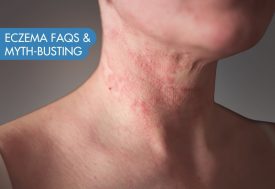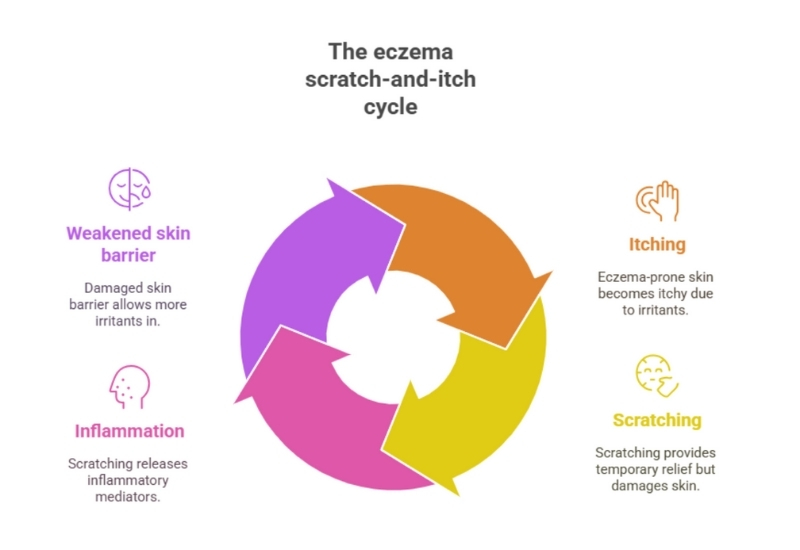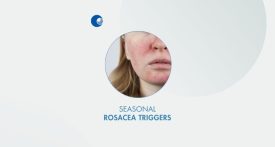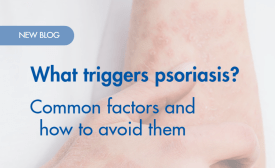At first glance, eczema might seem like just a patch of irritated (and irritating!) skin.
But if you or your child is living with eczema, you’ll probably know that it can be so much more than that. The itching can keep you up at night, the red patches can be uncomfortable and unsightly. Flare-ups can be unpredictable and distressing.
There’s plenty of online advice about eczema – and plenty of misinformation too. Here, our dermatologists answer some of the most frequently asked questions about eczema to help you understand how best to nourish and soothe your skin.
What is eczema?
Eczema, or atopic dermatitis, is the most common chronic inflammatory skin condition worldwide. It can cause dry, itchy, inflamed skin and often comes and goes in cycles.
Eczema-prone skin doesn’t retain moisture well and dries out easily. That can trigger the infamous scratch-and-itch cycle, which damages your skin.
How common is eczema?
Eczema is a very common skin condition. It’s thought to affect about 15-20% of children. While many grow out of it, about 10% of adults live with eczema.Winter and cold weather effects
Is eczema communicable?
No. Eczema is not contagious. You can’t catch it by touching someone’s skin, sharing towels, or hugging a friend.
Eczema is caused by a combination of factors, including:
- Genetics
- A compromised skin barrier
- Immune system responses
- Environmental triggers, including stress.
You might inherit a tendency to develop eczema, especially if you have a family history of hay fever, asthma, or food allergies.
Will eczema go away?
Sometimes.
Children often “grow out of” eczema as their immune system and skin barrier strengthen with age.
But for others, eczema remains a lifelong condition, flaring up during colder months, stressful periods, or changes in skincare. That’s why it’s important to find a capable, caring dermatologist who can help you manage eczema.
Is ocean water good for eczema?
This is an important question for beach-loving Aussies! Many people report that their skin feels better after a swim in the ocean. That’s likely because salt water can have a gentle antiseptic effect, helping to reduce bacteria and inflammation. Sunlight (in moderation) can also benefit some people with eczema.
But ocean water can also dry out your skin, especially if you stay in too long or don’t moisturise afterwards. And for people with open wounds or cracked skin, salt water can sting.
Our advice? Rinse off after swimming (lukewarm water is best) and apply a rich, fragrance-free moisturiser to lock hydration in.
And it goes without saying—sunscreen is a must when you’re out in the sun. For individuals with eczema, choosing the right sunscreen is crucial for protecting sensitive skin while avoiding flare-ups. Mineral sunscreens, especially those with zinc oxide and titanium dioxide, are often the best choice.
Can stress bring on eczema?
Unfortunately, yes. Stress doesn’t cause eczema but it can certainly trigger or worsen flare-ups.
Stress causes physiological reactions such as the release of:
- Hormones like cortisol, which supply energy but can weaken your skin barrier
- Various cytokines (proteins) which increase inflammation and worsen eczema.
Stress may also activate nerve fibres in the skin leading to more itching and scratching.
As you can see, managing stress is a key part of managing eczema. At Sinclair Dermatology, we routinely ask about any stress you’re under and how you manage it as this is an important aspect of eczema care.
Is eczema an autoimmune disease?
Not exactly. Eczema is considered an immune-mediated condition rather than a classic autoimmune disease like lupus or coeliac disease.
In eczema, the immune system overreacts to irritants or allergens, leading to inflammation. This is different from autoimmune diseases, where the immune system mistakenly attacks healthy cells. However, the immune response is a key part of eczema, which is why immunomodulating treatments are often prescribed.
Can antihistamines help eczema?
Antihistamines don’t treat the root cause of eczema, but they can help with itch relief, especially at night.
The Australasian College of Dermatologists does not recommend using systemic non-sedating antihistamines for itchy rashes like eczema and psoriasis.
However, sedating antihistamines may help you sleep better when itching is intense.
Talk to your GP or dermatologist to find out if sedating antihistamines could help you.
Is coconut oil good for eczema?
Coconut oil has natural antibacterial and moisturising properties, and many people with eczema find it soothing. Others may react to coconut oil, especially if they have sensitive skin or allergies. It can also clog pores in some cases.
At Sinclair Dermatology, we prefer to recommend evidence-based moisturisers designed specifically for eczema-prone skin.
So, how is eczema treated?
Eczema treatment is about:
- Relieving symptoms
- Repairing the skin barrier
- Reducing flare-ups.
To create a personalised eczema management plan, your dermatologist may:
- Examine your skin to assess the severity of your eczema
- Ask about:
- Your family history
- Triggers that worsen your eczema
- Treatments you’ve tried so far.
Treatment may include:
- Prescription steroids or non-steroid creams
- Regular use of emollients (moisturisers)
- Managing allergens or irritants
- Prescription medicines for infected eczema
- Phototherapy for chronic cases
- Immunosuppressive treatments for severe eczema.
At Sinclair Dermatology, we recognise that eczema is a multifaceted condition and so we employ evidence-based medical treatments alongside education and lifestyle advice.
Clinical Trials
Sinclair Dermatology regularly runs clinical trials focused on eczema and other dermatological conditions. Having conducted over 100 global trials, many of which have led to TGA-approved treatments now accessible to the public, our team is proud to contribute to advancing dermatology care.
Ready to take the next step?
If you’re struggling with eczema, whether it’s on your hands, face, or all over, you’re not alone, and you don’t have to suffer in silence. At Sinclair Dermatology, we offer personalised eczema management plans.
Disclaimer
All information is general and not intended as a substitute for professional advice. Sinclair Dermatology can consult with you regarding your individual health needs.
References
- Allergy and Anaphylaxis Australia, Eczema, https://allergyfacts.org.au/__interest/eczema/, [Accessed 3 June 2025]
- Eczema Association Australasia, Understanding eczema, https://eczema.org.au/understanding-eczema/, [Accessed 3 June 2025]
- National Eczema Association, Swimming with eczema, https://nationaleczema.org/blog/swimming-eczema/, [Accessed 3 June 2025]
- National Eczema Assoication, Stress and eczema, https://nationaleczema.org/eczema-management/stress/, [Accessed 3 June 2025]
- Choosing Wisely, The Australasian College of Dermatologists, https://www.choosingwisely.org.au/recommendations/acd6, [Accessed 3 June 2025]








